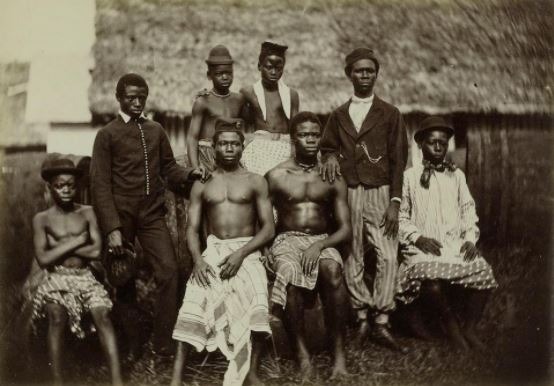WAEC History Answers & Questions for 2025 Essay & Objective Released.
The Waec history answers 2025 to the waec essay and obj exam question papers that will take place on Tuesday, 28th May 2024 will commence at 2.00 pm and end by 5.00 pm can be accessed on this page. The WAEC History paper is for the West African Examination Council Senior School Certificate Examination (SSCE). In this post, we will be posting Waec history answers 2023 for candidates who will participate in the examination for study purposes.
Note that below are the questions from WAEC history past questions and answers that we feel are likely questions for exam preparation.

Also See: WAEC Physics Practical Apparatus & Questions Here
WAEC History Answers and Questions 2024.
Section B [Essay]
Answer any four questions.
Write your answers on the answer booklet provided.
1. Identify any five features of trade development in pre-colonial Nigeria.
ANS: (i) People exchanged goods on the basis of barter;
(ii) Existence of markets and market days;
(iii) The existence of long-distance trading as people went the extra mile to source for scarce goods;
(iv) Existence of professional traders;
(v) Development of trade routes as a result of regular usage.
2. (a) Mention three Hausa States before the colonial period.
(b) Highlight four economic activities of the Hausa in pre-colonial times.
ANS: (a)The Hausa states in the pre-colonial period include Kano, Rano, Gobir, Zamfara, Biram, Nupe, etc.
(b) (i) They cultivated food crops eg millet which they sold to generate income.
(ii) The Hausa engaged in the production of textile;
(iii) Internal and external trade flourished in pre-colonial times. Trans-Saharan trade led to the growth of many trading centers like Katsina, Zaria, Kano;
(iv) Fishing;
(v) mining;
(vi) blacksmiths;
(vii) leatherwork, etc.
3. Outline any five factors which contributed to the fame of the Benin kingdom during the pre-colonial period.
ANS: (i) Able and strong leadership;
(ii) different sources of revenue;
(iii) trade connections with the Europeans along the Coast;
(iv) the skills of the craftsmen in the production of bronze human heads and other figures;
(v) .
4. (a) Name the areas where the following Yoruba warriors became overlords.
Kurunmi;
Ogedengbe;
Ogunmol.
(b) Identify any four consequences of the Yoruba civil war of the 19th century.
5. (a) Mention the process of pottery making in pre-colonial times.
(b) Outline any four uses of pottery in pre-colonial times.
ANS: (a) (i) collect clay
(ii) break the clay into pieces;
(iii) add water to the clay;
(iv) soak the mixture for a day;
(v) sieve to remove impurities and drain the water;
(vi) kneed and model the shape;
(vii) allow to dry and then fire.
(b) (i) pots were used for fetching water;
(ii) pots were used for storage;
(iii) for cooking;
(iv) used as plates and bowls;
(v) they were used for ritual purposes.
6. Outline any five disadvantages of the colonial economic policy on Nigeria.
ANS: (i) Indigenous traders were displaced by European traders and their agents;
(ii) the trade relationship led to a situation in which Nigeria’s fiscal system became attached to that of Britain in that during the colonial rule, the worth of Nigeria’s money was measured in relation to that of Britain;
(iii) indigenous system of technology was discouraged by the colonial authorities;
(iv) the colonial government encouraged the production of cash crops at the expense of food crops;
(v) The British did not invest the large profits from the sale of Nigerian products in the country;
(vi) it promoted the construction of railways from the north to the coast solely to convey raw materials for export.
7. (a) State two reasons for the failure of Indirect Rule in Igboland.
(b) Outline any three outcomes of the Aba Women Riot of 1929.
ANS: (a) (i) The units of Igbo society in Eastern Nigeria were too small to shoulder the responsibilities expected by the Indirect rule system;
(ii) Igboland-operated village democracy;
(iii) there was an absence of traditional authorities to command the obedience of the people;
(iv) The people were already used to the British system of direct administration because of their early contact with the British authority in the inland in 1893.
(b) (i) A commission of inquiry was set up having two Nigerian barristers, Sir Akintoye Ajasa and Mr. Eric Moore as representatives to investigate the causes of the riot and made recommendations;
(ii) re-organization of the system in line with the customs of the people;
(iii) Anthropological surveys of the area were conducted.
(iv) Warrant chiefs system remained, but with a consequent reduction of their authority.
8. Highlight any five steps taken by the Buhari administration in Nigeria to improve the economic and social life of the people between 1983 and 1984.
ANS: (i) The regime banned the importation of some foreign goods. This was to improve the country’s foreign reserves;
(ii) the regime encouraged the production of goods using local resources;
(iii) the regime issued decrees against smuggling, drug trafficking, and illegal oil bunkering. Drug pushers and illegal oil bunkers were executed by firing squad;
(iv) the regime imprisoned corrupt politicians. Corrupt public officers were also probed and tried by special tribunals;
(v) The regime tried to solve the unemployment problem in the country by expelling illegal aliens who caused social and economic problems in the country.
9. (a) List any three members of the Economic Community of West African States (ECOWAS).
(b) Highlight four benefits Nigeria has derived from her membership of the Economic Community of West African States (ECOWAS) since 1975.
10.
NOTE: There is nothing like Waec history expo online. Do not be deceived by fraudsters posing with fake Waec answers on the internet.
Keep following, more questions and answers will be added soon.
